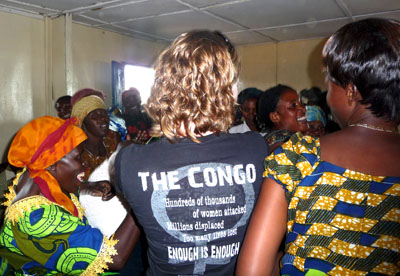
Something incredible and inspiring happened during our visit to Buhimba, a camp for internally displaced persons located in the outskirts of Goma in North Kivu. When we arrived, we were led into a room and asked to sit down on a bench along the wall. Within minutes, dozens of women living in the camp, many of whom were carrying their babies, had filed in and sat on the benches along the wall. As the benches filled, women started sitting on the floor. Before we knew it, the room was completely full of women staring up at us intently.
Then, a woman named “Claudia” stood up, regally walked to the center of the room, and began to speak. She told us she was the spokesperson for women in the camp, and we immediately understood why. She proceeded to tell us the many challenges the women and families in the camp face. Many of the women there had fled the fighting in Rutshuru, and had been living in the camp for nearly two years. She said the fighting in their home villages is no longer organized. There are many different armed groups who loot, pillage, and rape. The violence is scattered, unpredictable, and chaotic. Many of the rebels appear to be civilians during the day, and then at night will attack people in the village, often burning down their homes along the way.
Another woman stood up and told us that the FDLR is in the bush, the Congolese army is in the town, and MONUC (the U.N. mission in Congo) can’t be found. If she goes out to buy beans, she must give some of the beans to the FDLR and then give some of them to the army. She said you are lucky if that is the only tax you have to pay. Women often pay an even steeper price – they are raped. She said they came to the camp because they are tired of the violence. As she told us her story, she seems both angry and determined.
Claudia moved back to the middle of the room and described life in the camp. The residents receive assistance from the NGOs in the camp, but it is not enough. Their food rations have been cut in half, and the schools are not big enough to accommodate all the children. The students don’t have uniforms, books, or supplies. Women cannot talk about sexual violence because they will be rejected from their families, and it will bring about a “second wave of trouble.”
Claudia gave us a message to take home with us. She said that the women at Buhimba await peace so that they can safely return home, tend to their fields, and feed their children. She said many of their houses have been burned down, and they would like some help to rebuild their houses and enough tools to get them through to the next harvest. After that, they can take care of themselves. But first they need peace.
When Claudia finished, she presented us with a handmade bag to thank us for our visit. I felt self-conscious accepting the gift. We are the ones who are grateful to these women for feeling comfortable sharing their stories with us. This impromptu “town hall” is important: The women in Buhimba and hundreds of thousands more women like them throughout eastern Congo have been forgotten by the rest of the world. They want their voices to be heard. Their stories have meaning, and these women do matter.
And then, without hesitation, the women all stood up and started singing and dancing. One woman moved to the middle of the circle and started jumping up and dancing like I’d never seen before. Their energy and enthusiasm was infectious, and so we joined them in the circle. As I tried, in my admittedly limited ability, to dance and sing along with them, I felt uplifted. These women face more challenges in one day than most of us will face in a lifetime. And yet they still have happiness and joy. They have inspired me more than words can explain.
Candice Knezevic, the RAISE Hope for Congo campaign manager, is currently traveling in eastern Democratic Republic of the Congo.

